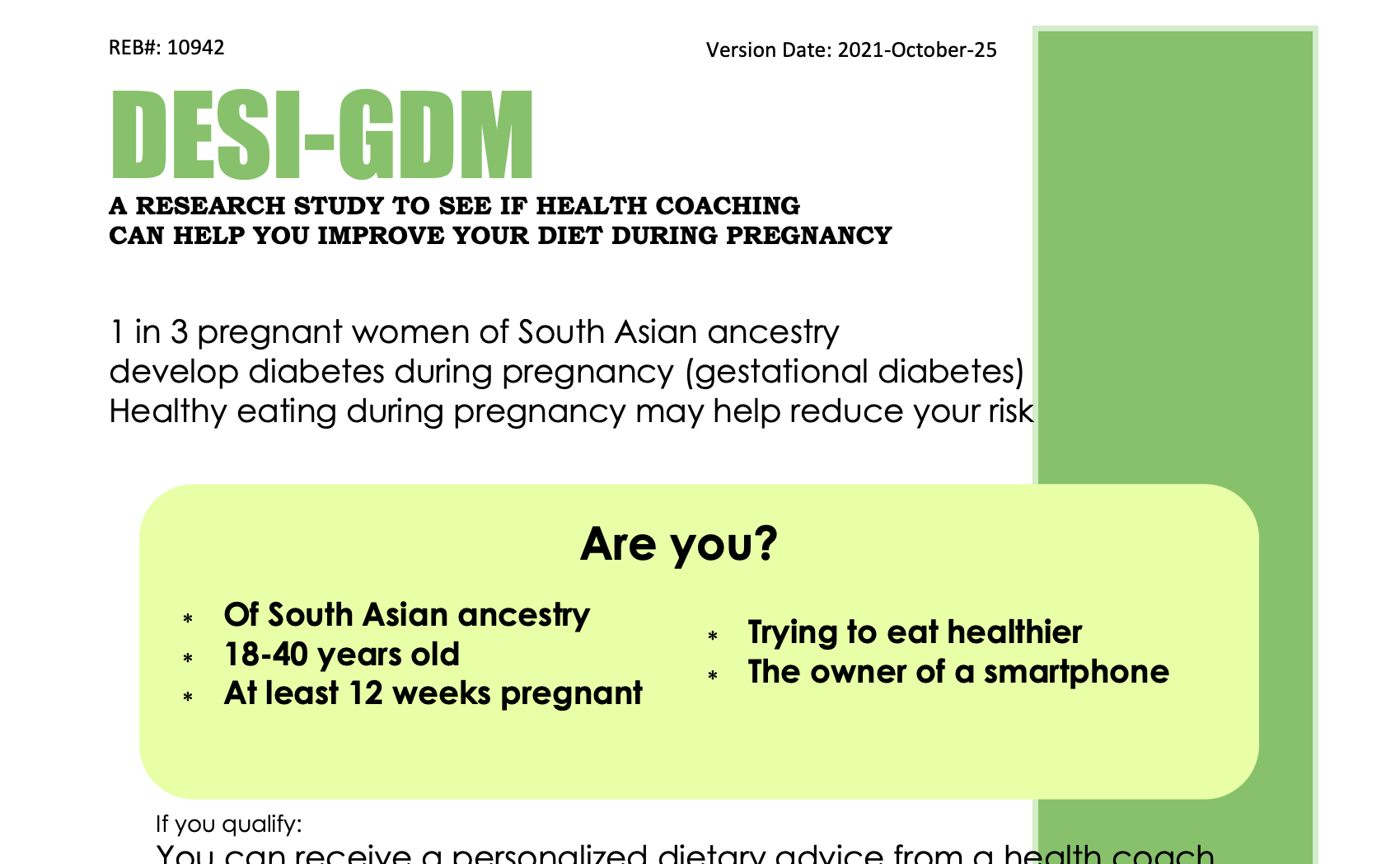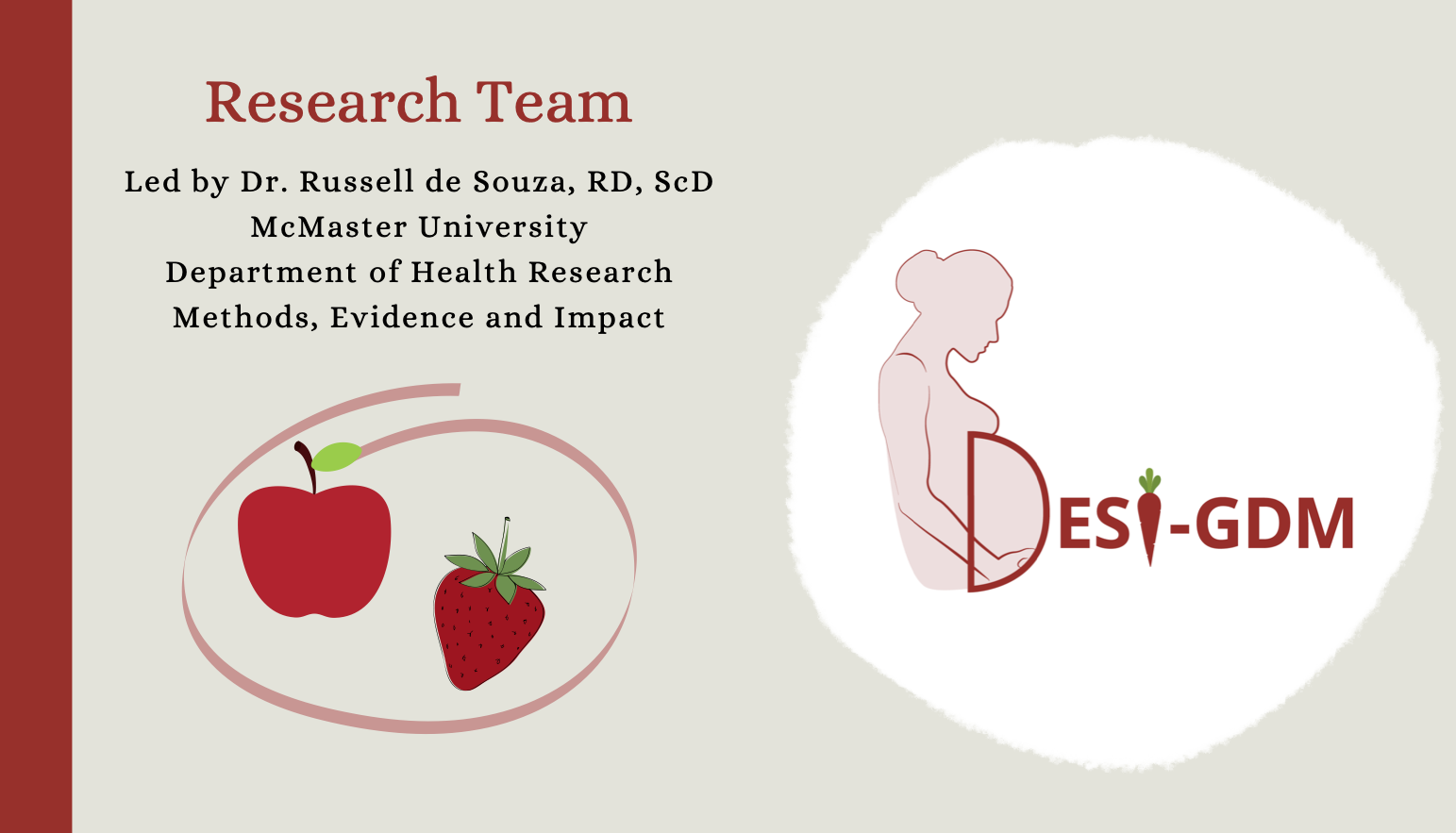Overview
What is DESI-GDM?
Some women without diabetes develop high blood sugar levels late in pregnancy, a condition known as gestational diabetes (GDM). Approximately half of women with gestational diabetes develop type 2 diabetes within five years of giving birth and gestational diabetes predicts future heart disease and stroke in the mother. It also increases the lifetime risk of diabetes in her child up to eight-fold. Some people are more prone to develop gestational diabetes than others. South Asians are people whose ancestors are from India, Pakistan, Bangladesh or Sri Lanka. They are the largest non-white ethnic group in Canada. Recently, we have shown that about one in three South Asian women in Ontario develop gestational diabetes, a rate much higher than in other non-Asian populations. Untreated, GDM can increase the risk of a large-for-gestational age baby and maternal and offspring risks of obesity and type 2 diabetes. Interventions that can prevent gestational diabetes in this population may reduce future risk of diabetes, heart disease and stroke in both mother and baby.
This study will assess whether a culturally tailored, personalized nutrition intervention delivered by a trained health coach to pregnant South Asian women:
- Improves blood sugar levels to a greater extent than usual dietary advice
- Reduces the incidence of gestational diabetes mellitus to a greater extent than usual dietary advice
Recent Publications
WEBSITE
A culturally tailored personaliseD nutrition intErvention in South ASIan women at risk of Gestational Diabetes Mellitus (DESI-GDM): a randomised controlled trial protocol
Stennett RN, Adamo KB, Anand SS, Bajaj HS, Bangdiwala SI, Desai D, Gerstein HC, Kandasamy S, Khan F, Lear SA, McDonald SD, Pocsai T, Ritvo P, Rogge A, Schulze KM, Sherifali D, Stearns JC, Wahi G, Williams NC, Zulyniak MA, de Souza RJ. A culturally tailored personaliseD nutrition intErvention in South ASIan women at risk of Gestational Diabetes Mellitus (DESI-GDM): a randomised controlled trial protocol. BMJ Open. 2023 May 2;13(5):e072353. doi: 10.1136/bmjopen-2023-072353. PMID: 37130668; PMCID: PMC10163497.
WEBSITE
Causes and consequences of gestational diabetes in South Asians living in Canada: results from a prospective cohort study
Anand SS, Gupta M, Teo KK, Schulze KM, Desai D, Abdalla N, Zulyniak M, de Souza R, Wahi G, Shaikh M, Beyene J, de Villa E, Morrison K, McDonald SD, Gerstein H; South Asian Birth Cohort (START) - Canada Investigators. Causes and consequences of gestational diabetes in South Asians living in Canada: results from a prospective cohort study. CMAJ Open. 2017 Aug 9;5(3):E604-E611. doi: 10.9778/cmajo.20170027. PMID: 28800568; PMCID: PMC5621966.
WEBSITE
Fine-tuning of Genome-Wide Polygenic Risk Scores and Prediction of Gestational Diabetes in South Asian Women
Lamri A, Mao S, Desai D, Gupta M, Paré G, Anand SS. Fine-tuning of Genome-Wide Polygenic Risk Scores and Prediction of Gestational Diabetes in South Asian Women. Sci Rep. 2020 Jun 2;10(1):8941. doi: 10.1038/s41598-020-65360-y. PMID: 32488059; PMCID: PMC7265287.
Information for Participants
Purpose of DESI-GDM
Why is this research being done?
- Some women without diabetes develop high blood sugar levels during pregnancy, this condition is called gestational diabetes (GDM)
- Pregnant South Asian individuals develop GDM two times as often as white individuals
- Diet changes during pregnancy may improve blood sugar levels
- We think seeing a nutrition coach during pregnancy can help improve diet, but are unsure if this will have a large impact on blood sugar levels
Participation
Visits
Attend two visits, at our clinic or virtually. You will be compensated with a $25 gift card for baseline and follow-up visit.
- Baseline visit: Three to four months gestation, one to one-and-a-half hours
- Follow-up visit: Six to months gestation, two hours
Sample Collection
- Baseline visit: fasting blood samples and fasting urine sample
- Follow-up visit: fasting blood sample, fasting urine sample, glucose testing and additional blood samples for long-term storage (optional)
The Intervention
If you are randomly selected, you will be asked to…
- Meet with a health coach to develop goals and a plan to achieve them
- Follow-up with your health coach every two weeks
- Install two applications on your mobile device
- Wear a Fitbit for up to 16 weeks
- Agree to receive up to five text messages per week related to diet and exercise
“I couldn’t be happier with my experience being enrolled in the DESI-GDM study! The staff were lovely, explained everything clearly and answered all my questions. The surveys are also simple and sweet and don’t take very long to complete. I recommend this opportunity to all pregnant South Asian moms! It is terrific way to help our community!”
– DESI-GDM Participant
Eligibility
Who is eligible?
- Being of South Asian ancestry (self-identified)
- Are 12-18 weeks pregnant and singleton pregnancy
- At least two of the following GDM risk factors:
- At least 29 years old
- A poor quality diet
- Family history of diabetes mellitus
- GDM during a previous pregnancy
- A pre-pregnancy body mass index (BMI) of at least 23
If any of the following apply to you, you are not eligible:
- A diagnosis of type 1 or type 2 diabetes
- High blood pressure
- Poor understanding of English
- Unwilling to modify diet
- At high risk of adverse pregnancy outcome other than GDM
- Enrolment in another study
- Do not have a smartphone
- Not willing to walk
- Excessive nausea and/or vomiting
Information for Physicians
“Hi, my name is Dr. Naila Furqan and I’m a Family Physician in Ontario.
DESI-GDM is a research study that is determining the effectiveness of health coaching to improve diet during pregnancy, and I have referred many patients into the DESI-GDM study.
The referral process of the study is a very simple and straightforward one. I introduce the study to the patient and if she agrees to share her contact information and learn more details about the study, I fill out a referral form and fax it to the study team.
I would strongly recommend the study to all the South Asian pregnant women to participate and all the health care providers to help in the recruitment process for this great cause.”
– Dr. Naila Furqan (MD, CCFP)
About the Study
Some women without diabetes develop high blood sugar levels late in pregnancy, a condition known as gestational diabetes (GDM). Approximately half of women with gestational diabetes develop type 2 diabetes within five years of giving birth, and gestational diabetes predicts future heart disease and stroke in the mother. It also increases the lifetime risk of diabetes in her child up to eight-fold. Some people are more prone to develop gestational diabetes than others. South Asians are people whose ancestors are from India, Pakistan, Bangladesh or Sri Lanka. They are the largest non-white ethnic group in Canada. Recently, we have shown that about one in three South Asian women in Ontario develop gestational diabetes, a rate much higher than in other non-Asian populations. Untreated, GDM can increase the risk of a large-for-gestational age baby and maternal and offspring risks of obesity and type 2 diabetes. Interventions that can prevent gestational diabetes in this population may reduce future risk of diabetes, heart disease and stroke in both mother and baby.
This study will assess whether a culturally tailored, personalized nutrition intervention delivered by a trained health coach to pregnant South Asian women:
- Improves blood sugar levels to a greater extent than usual dietary advice
- Reduces the incidence of gestational diabetes mellitus to a greater extent than usual dietary advice
Eligibility
Who is eligible?
- Being of South Asian ancestry (self-identified)
- Are 12-18 weeks pregnant and singleton pregnancy
- At least two of the following GDM risk factors:
- At least 29 years old
- A poor quality diet
- Family history of diabetes mellitus
- GDM during a previous pregnancy
- A pre-pregnancy body mass index (BMI) of at least 23
If any of the following apply, you are not eligible:
- A diagnosis of type 1 or type 2 diabetes
- High blood pressure
- Poor understanding of English
- Unwilling to modify diet
- At high risk of adverse pregnancy outcome other than GDM
- Enrolment in another study
- Do not have a smartphone
- Not willing to walk
- Excessive nausea and/or vomiting
Downloadable Resources
Publications
Information Box Group
WEBSITE
A culturally tailored personaliseD nutrition intErvention in South ASIan women at risk of Gestational Diabetes Mellitus (DESI-GDM): a randomised controlled trial protocol
Stennett RN, Adamo KB, Anand SS, Bajaj HS, Bangdiwala SI, Desai D, Gerstein HC, Kandasamy S, Khan F, Lear SA, McDonald SD, Pocsai T, Ritvo P, Rogge A, Schulze KM, Sherifali D, Stearns JC, Wahi G, Williams NC, Zulyniak MA, de Souza RJ. A culturally tailored personaliseD nutrition intErvention in South ASIan women at risk of Gestational Diabetes Mellitus (DESI-GDM): a randomised controlled trial protocol. BMJ Open. 2023 May 2;13(5):e072353. doi: 10.1136/bmjopen-2023-072353. PMID: 37130668; PMCID: PMC10163497.
WEBSITE
Causes and consequences of gestational diabetes in South Asians living in Canada: results from a prospective cohort study
Anand SS, Gupta M, Teo KK, Schulze KM, Desai D, Abdalla N, Zulyniak M, de Souza R, Wahi G, Shaikh M, Beyene J, de Villa E, Morrison K, McDonald SD, Gerstein H; South Asian Birth Cohort (START) - Canada Investigators. Causes and consequences of gestational diabetes in South Asians living in Canada: results from a prospective cohort study. CMAJ Open. 2017 Aug 9;5(3):E604-E611. doi: 10.9778/cmajo.20170027. PMID: 28800568; PMCID: PMC5621966.
WEBSITE
Fine-tuning of Genome-Wide Polygenic Risk Scores and Prediction of Gestational Diabetes in South Asian Women
Lamri A, Mao S, Desai D, Gupta M, Paré G, Anand SS. Fine-tuning of Genome-Wide Polygenic Risk Scores and Prediction of Gestational Diabetes in South Asian Women. Sci Rep. 2020 Jun 2;10(1):8941. doi: 10.1038/s41598-020-65360-y. PMID: 32488059; PMCID: PMC7265287.
WEBSITE
Studies to Improve Perinatal Health through Diet and Lifestyle among South Asian Women Living in Canada: A Brief History and Future Research Directions
Desai D, Kandasamy S, Limbachia J, Zulyniak MA, Ritvo P, Sherifali D, Wahi G, Anand SS, de Souza RJ. Studies to Improve Perinatal Health through Diet and Lifestyle among South Asian Women Living in Canada: A Brief History and Future Research Directions. Nutrients. 2021 Aug 24;13(9):2932. doi: 10.3390/nu13092932. PMID: 34578810; PMCID: PMC8465246.
WEBSITE
The effects of various diets on glycemic outcomes during pregnancy: A systematic review and network meta-analysis
Ha V, Bonner AJ, Jadoo JK, Beyene J, Anand SS, de Souza RJ. The effects of various diets on glycemic outcomes during pregnancy: A systematic review and network meta-analysis. PLoS One. 2017 Aug 3;12(8):e0182095. doi: 10.1371/journal.pone.0182095. PMID: 28771519; PMCID: PMC5542432.
WEBSITE
The genetic risk of gestational diabetes in South Asian women
Lamri A, Limbachia J, Schulze KM, Desai D, Kelly B, de Souza RJ, Paré G, Lawlor DA, Wright J, Anand SS; Born in Bradford and START investigators. The genetic risk of gestational diabetes in South Asian women. Elife. 2022 Nov 22;11:e81498. doi: 10.7554/eLife.81498. PMID: 36412575; PMCID: PMC9683781.
Frequently Asked Questions
Expandable List
A culturally tailored personalized nutrition intervention in South Asian women at risk of Gestational Diabetes Mellitus: a randomized trial (DESI-GDM).
Women who don’t have diabetes may develop high blood sugar levels only during pregnancy, which is called gestational diabetes. This may put her and the baby at risk for diabetes or heart disease in the future. It has been found that one in three South Asian pregnant women develop this condition. However, it is possible that diet changes may improve blood sugar levels during pregnancy. This study is being done to test if a personalized nutrition plan designed by a health coach for South Asian pregnant women will:
- Improve their blood sugar levels
- Prevent gestational diabetes
We are hoping to recruit 190 participants.
The study is being run by a team of health researchers, led by Dr. Russell de Souza RD ScD, via the Population Research Institute (PHRI), a joint institute of McMaster University and Hamilton Health Sciences.
If you are randomly selected to be a part of our intervention group, rather than the control group, you will meet with a health coach who will create a nutrition plan personalised to you. You will also get to learn more about your food intake and exercise patterns, as well, via apps and the supervision of the health coach. Lastly, you will be giving back to society! Your participation in the research will help us create possible solutions or preventative measures to lower the occurrences of gestational diabetes in pregnant women.
There are three time points in the study:
- Baseline visit (week 12-18 of pregnancy)
- Oral glucose tolerance test (OGTT) visit (week 24-28 of pregnancy)
- After-birth checkpoint
The time commitment is approximately 30-45 minutes for the baseline visit, two to three hours for the oral glucose tolerance test visit and about 10-20 minutes for the after-birth check point.
If you are in the intervention group, you will meet virtually with the health coach biweekly for about four months and get weekly SMS messages reminding you to be physically active. We may contact you briefly in between visits for simple things, like clarifying data you gave us, reminding you to complete the surveys or reminding you of upcoming time point appointments.
The study is very flexible and works around your time schedule. We ask for your availability and set appointments based on what is convenient for you. Please note that we must ensure that the time point appointments fall during the specified pregnancy week ranges for each time point, as mentioned above.
You can do this study virtually via phone call, online (i.e., Zoom) or in-person at either our Brampton or Mississauga sites:
110 Cottrelle Boulevard
Brampton, Ontario
L6S 0E2
121-2550 Argentia Road
Mississauga, Ontario
L5N 5R1
No. Anyone in Southern Ontario can participate.
You will receive two $25 gift cards. One at the end of the baseline visit and one at the end of the oral glucose tolerance test visit.
The study poses very minimal risks to you and your baby. These include bruising, pain or fainting during blood collection. Please note that these occurrences are rare and that the blood collection will be done by certified phlebotomists or certified health professionals.
Your blood samples taken during the oral glucose tolerance test will be used to measure your blood sugar levels and then discarded. If you choose to provide additional blood sample for research purposes, these will be stored and processed in our secured laboratories at Hamilton Health Sciences and will be labeled anonymously – your personal identification will not be used to label these samples.
Completing the oral glucose tolerance test is a requirement of this study. However, you can refuse to provide additional samples and still be a part of the study.
No, all tests and resources will be provided to you by the research team. We ask that you return the FitBit upon completing the study. The health coach’s service will be free of charge to you.
Yes, confidentiality and your privacy are very important to us.
Your data will not be shared with anyone except for your consent, as the law requires that. All your data will be anonymously labeled using a random identification number and will not be linked to you. This data will be stored on a secured server in a locked research office.
Yes, you can withdraw at any point in the study. If you decide to withdraw from the study, there will be no cost to you nor any impact on your ability to access healthcare.
DESI-GDM Team
Information Box Group
Harpreet Bajaj
Co-Investigator
DESI-GDM
Harpreet Singh Bajaj is an endocrinologist and medical director of endocrine and metabolic research at LMC Healthcare/Centricity Research in Canada. Dr Bajaj completed his endocrinology fellowship at the Cleveland Clinic (Ohio, USA). Dr Bajaj’s medical education was at University of Delhi, India, followed by a master’s of public health (epidemiology) at State University of New York in Albany (New York, USA).
Dr. Bajaj’s research focus and publications in key medical journals relate to type 2 diabetes (prevention, remission and management), obesity and cardiorenal risk reduction.
He is the principal investigator of the Canadian Diabetes Prevention Program, a nationwide collaborative effort between LMC, Diabetes Canada funded by the Public Health Agency of Canada. Dr. Bajaj currently serves Diabetes Canada as the chair of the Clinical Practice Guidelines Steering Committee.

Harpreet Bajaj
Co-Investigator
DESI-GDM
Russell de Souza
RD, ScD
Associate Professor
Principal Investigator of
DESI-GDM
Department of Health Research Methods, Evidence and Impact

Russell de Souza
RD, ScD
Associate Professor
Principal Investigator of
DESI-GDM
Department of Health Research Methods, Evidence and Impact
Dipika Desai
Program Manager
Population Health Research Institute
Chanchlani Research Centre
Dipika Desai oversees many epidemiologic studies, including the South Asian birth cohort (START), Nutrition and Genomics (NutriGen) and the Canadian Alliance for Healthy Hearts and Minds (CAHHM), as well as management, assistance and oversight of the utilization of samples from a number of other studies.
She has a bachelor’s degree in food and nutrition from the MS University of Baroda, India and a master’s degree in human nutrition from the University of British Columbia.

Dipika Desai
Program Manager
Population Health Research Institute
Chanchlani Research Centre
Farah Khan
Site Research Coordinator
Farah is a research coordinator at Population Health Research Institute (PHRI) and works in the Department of Population Genomics. Her interests are in women and child health, cardiovascular and global health. She is the site lead for multiple projects like cohorts, observational and randomized control trials.

Farah Khan
Site Research Coordinator
Anisha Mahajan
Health Coach
Anisha Mahajan is a full-time PhD candidate at the University of Guelph and a clinical dietitian in multiple program areas in Ontario, Canada. Anisha has worked as a registered dietitian for over 10 years in healthcare. She completed her undergraduate degree from Toronto Metropolitan University, Ontario, in nutrition and food in 2004, her dietetic internship from ARAMARK Canada Ltd. in 2010 and her master of public health (MPH) in nutrition and dietetics from the Dalla Lana School of Public Health, at the University of Toronto, in 2017. Anisha was born and raised in Delhi, India. In 1999 she moved to Ontario, Canada, as an international student. She is fluent in Hindi, Punjabi and Urdu.

Anisha Mahajan
Health Coach
Mehnaz Munir
Doctoral Student
Mehnaz Munir is a medical doctor and is currently pursuing a PhD in Global Health at McMaster University. Currently, she is working to improve patient enrolment in this study and collect the glucose tolerance test results of enrolled patients.

Mehnaz Munir
Doctoral Student
Andrea Rogge
Research Coordinator
Andrea Rogge has been at the Population Health Research Institute (PHRI) since 2010 and has supported the coordination of large international industry sponsored trials and investigator-initiated trials. She has a bachelor’s degree in history from the University of Guelph and has completed the Applied Clinical Research Certificate Program through McMaster University.

Andrea Rogge
Research Coordinator
Jennifer Siekel
Study Coordinator
Jennifer Siekiel has been at the Population Health Research Institute (PHRI) since 2021, supporting clinical research trials with the population genetics team. She has a bachelor’s degree in psychology, neuroscience and behaviour from McMaster University with a minor in health, aging and society.

Jennifer Siekel
Study Coordinator
Rosain Stennett
PhD candidate
Doctoral Student
Qualitative Study Lead
Rosain is currently a PhD(c) in the Department Health Research Methods, Evidence and Impact at McMaster University. She has a BSc in Foodservice Management from the University of Technology, Jamaica and MPH – Nutrition from Northern Caribbean University, Jamaica. She has experience in research and project development, management and evaluation in the areas of food and nutrition, maternal and child health, health research methods and nursing education. Rosain also has a strong interest in health promotion, research methods and health policy through behavioural patterns, societal norms and their impact/relationship to nutrition-related health outcomes.

Rosain Stennett
PhD candidate
Doctoral Student
Qualitative Study Lead
Daislyn Vidal
Site Research Assistant
Daislyn Vidal is the research assistant for the DESI-GDM study. She will be one of the friendly faces that participants will directly interact with during the study. Daislyn is responsible for introducing participants to the study, scheduling calls and visits, conducting those calls and visits and following up with participants throughout the study.
Before working with Population Health Research Institute (PHRI), Daislyn pursued a master’s in applied health sciences, which equipped her with effective health research, interpersonal, communication and patient care related skills. Daislyn has a deep passion for the improvement of human health, especially the health of marginalized populations, such as the South Asian community, through innovative health research. She is currently living out her passion by being on the frontline of this DESI-GDM study, which aims to investigate if dietary intervention can help to reduce or prevent the risk of gestational diabetes in pregnant South Asian women. Daislyn is excited and hopeful that the study will possibly create some awareness about, and develop helpful interventions to, combat DESI-GDM, thereby producing a positive and lasting impact on the health and lives of persons in the South Asian community.

Daislyn Vidal
Site Research Assistant
Harpreet Bajaj
Co-Investigator
DESI-GDM
Harpreet Singh Bajaj is an endocrinologist and medical director of endocrine and metabolic research at LMC Healthcare/Centricity Research in Canada. Dr Bajaj completed his endocrinology fellowship at the Cleveland Clinic (Ohio, USA). Dr Bajaj’s medical education was at University of Delhi, India, followed by a master’s of public health (epidemiology) at State University of New York in Albany (New York, USA).
Dr. Bajaj’s research focus and publications in key medical journals relate to type 2 diabetes (prevention, remission and management), obesity and cardiorenal risk reduction.
He is the principal investigator of the Canadian Diabetes Prevention Program, a nationwide collaborative effort between LMC, Diabetes Canada funded by the Public Health Agency of Canada. Dr. Bajaj currently serves Diabetes Canada as the chair of the Clinical Practice Guidelines Steering Committee.
Harpreet Bajaj
Co-Investigator
DESI-GDM
Harpreet Singh Bajaj is an endocrinologist and medical director of endocrine and metabolic research at LMC Healthcare/Centricity Research in Canada. Dr Bajaj completed his endocrinology fellowship at the Cleveland Clinic (Ohio, USA). Dr Bajaj’s medical education was at University of Delhi, India, followed by a master’s of public health (epidemiology) at State University of New York in Albany (New York, USA).
Dr. Bajaj’s research focus and publications in key medical journals relate to type 2 diabetes (prevention, remission and management), obesity and cardiorenal risk reduction.
He is the principal investigator of the Canadian Diabetes Prevention Program, a nationwide collaborative effort between LMC, Diabetes Canada funded by the Public Health Agency of Canada. Dr. Bajaj currently serves Diabetes Canada as the chair of the Clinical Practice Guidelines Steering Committee.
Russell de Souza
RD, ScD
Associate Professor
Principal Investigator of
DESI-GDM
Department of Health Research Methods, Evidence and Impact
Russell de Souza
RD, ScD
Associate Professor
Principal Investigator of
DESI-GDM
Department of Health Research Methods, Evidence and Impact
Dipika Desai
Program Manager
Population Health Research Institute
Chanchlani Research Centre
Dipika Desai oversees many epidemiologic studies, including the South Asian birth cohort (START), Nutrition and Genomics (NutriGen) and the Canadian Alliance for Healthy Hearts and Minds (CAHHM), as well as management, assistance and oversight of the utilization of samples from a number of other studies.
She has a bachelor’s degree in food and nutrition from the MS University of Baroda, India and a master’s degree in human nutrition from the University of British Columbia.
Dipika Desai
Program Manager
Population Health Research Institute
Chanchlani Research Centre
Dipika Desai oversees many epidemiologic studies, including the South Asian birth cohort (START), Nutrition and Genomics (NutriGen) and the Canadian Alliance for Healthy Hearts and Minds (CAHHM), as well as management, assistance and oversight of the utilization of samples from a number of other studies.
She has a bachelor’s degree in food and nutrition from the MS University of Baroda, India and a master’s degree in human nutrition from the University of British Columbia.
Farah Khan
Site Research Coordinator
Farah is a research coordinator at Population Health Research Institute (PHRI) and works in the Department of Population Genomics. Her interests are in women and child health, cardiovascular and global health. She is the site lead for multiple projects like cohorts, observational and randomized control trials.
Farah Khan
Site Research Coordinator
Farah is a research coordinator at Population Health Research Institute (PHRI) and works in the Department of Population Genomics. Her interests are in women and child health, cardiovascular and global health. She is the site lead for multiple projects like cohorts, observational and randomized control trials.
Anisha Mahajan
Health Coach
Anisha Mahajan is a full-time PhD candidate at the University of Guelph and a clinical dietitian in multiple program areas in Ontario, Canada. Anisha has worked as a registered dietitian for over 10 years in healthcare. She completed her undergraduate degree from Toronto Metropolitan University, Ontario, in nutrition and food in 2004, her dietetic internship from ARAMARK Canada Ltd. in 2010 and her master of public health (MPH) in nutrition and dietetics from the Dalla Lana School of Public Health, at the University of Toronto, in 2017. Anisha was born and raised in Delhi, India. In 1999 she moved to Ontario, Canada, as an international student. She is fluent in Hindi, Punjabi and Urdu.
Anisha Mahajan
Health Coach
Anisha Mahajan is a full-time PhD candidate at the University of Guelph and a clinical dietitian in multiple program areas in Ontario, Canada. Anisha has worked as a registered dietitian for over 10 years in healthcare. She completed her undergraduate degree from Toronto Metropolitan University, Ontario, in nutrition and food in 2004, her dietetic internship from ARAMARK Canada Ltd. in 2010 and her master of public health (MPH) in nutrition and dietetics from the Dalla Lana School of Public Health, at the University of Toronto, in 2017. Anisha was born and raised in Delhi, India. In 1999 she moved to Ontario, Canada, as an international student. She is fluent in Hindi, Punjabi and Urdu.
Mehnaz Munir
Doctoral Student
Mehnaz Munir is a medical doctor and is currently pursuing a PhD in Global Health at McMaster University. Currently, she is working to improve patient enrolment in this study and collect the glucose tolerance test results of enrolled patients.
Mehnaz Munir
Doctoral Student
Mehnaz Munir is a medical doctor and is currently pursuing a PhD in Global Health at McMaster University. Currently, she is working to improve patient enrolment in this study and collect the glucose tolerance test results of enrolled patients.
Andrea Rogge
Research Coordinator
Andrea Rogge has been at the Population Health Research Institute (PHRI) since 2010 and has supported the coordination of large international industry sponsored trials and investigator-initiated trials. She has a bachelor’s degree in history from the University of Guelph and has completed the Applied Clinical Research Certificate Program through McMaster University.
Andrea Rogge
Research Coordinator
Andrea Rogge has been at the Population Health Research Institute (PHRI) since 2010 and has supported the coordination of large international industry sponsored trials and investigator-initiated trials. She has a bachelor’s degree in history from the University of Guelph and has completed the Applied Clinical Research Certificate Program through McMaster University.
Jennifer Siekel
Study Coordinator
Jennifer Siekiel has been at the Population Health Research Institute (PHRI) since 2021, supporting clinical research trials with the population genetics team. She has a bachelor’s degree in psychology, neuroscience and behaviour from McMaster University with a minor in health, aging and society.
Jennifer Siekel
Study Coordinator
Jennifer Siekiel has been at the Population Health Research Institute (PHRI) since 2021, supporting clinical research trials with the population genetics team. She has a bachelor’s degree in psychology, neuroscience and behaviour from McMaster University with a minor in health, aging and society.
Rosain Stennett
PhD candidate
Doctoral Student
Qualitative Study Lead
Rosain is currently a PhD(c) in the Department Health Research Methods, Evidence and Impact at McMaster University. She has a BSc in Foodservice Management from the University of Technology, Jamaica and MPH – Nutrition from Northern Caribbean University, Jamaica. She has experience in research and project development, management and evaluation in the areas of food and nutrition, maternal and child health, health research methods and nursing education. Rosain also has a strong interest in health promotion, research methods and health policy through behavioural patterns, societal norms and their impact/relationship to nutrition-related health outcomes.
Rosain Stennett
PhD candidate
Doctoral Student
Qualitative Study Lead
Rosain is currently a PhD(c) in the Department Health Research Methods, Evidence and Impact at McMaster University. She has a BSc in Foodservice Management from the University of Technology, Jamaica and MPH – Nutrition from Northern Caribbean University, Jamaica. She has experience in research and project development, management and evaluation in the areas of food and nutrition, maternal and child health, health research methods and nursing education. Rosain also has a strong interest in health promotion, research methods and health policy through behavioural patterns, societal norms and their impact/relationship to nutrition-related health outcomes.
Daislyn Vidal
Site Research Assistant
Daislyn Vidal is the research assistant for the DESI-GDM study. She will be one of the friendly faces that participants will directly interact with during the study. Daislyn is responsible for introducing participants to the study, scheduling calls and visits, conducting those calls and visits and following up with participants throughout the study.
Before working with Population Health Research Institute (PHRI), Daislyn pursued a master’s in applied health sciences, which equipped her with effective health research, interpersonal, communication and patient care related skills. Daislyn has a deep passion for the improvement of human health, especially the health of marginalized populations, such as the South Asian community, through innovative health research. She is currently living out her passion by being on the frontline of this DESI-GDM study, which aims to investigate if dietary intervention can help to reduce or prevent the risk of gestational diabetes in pregnant South Asian women. Daislyn is excited and hopeful that the study will possibly create some awareness about, and develop helpful interventions to, combat DESI-GDM, thereby producing a positive and lasting impact on the health and lives of persons in the South Asian community.
Daislyn Vidal
Site Research Assistant
Daislyn Vidal is the research assistant for the DESI-GDM study. She will be one of the friendly faces that participants will directly interact with during the study. Daislyn is responsible for introducing participants to the study, scheduling calls and visits, conducting those calls and visits and following up with participants throughout the study.
Before working with Population Health Research Institute (PHRI), Daislyn pursued a master’s in applied health sciences, which equipped her with effective health research, interpersonal, communication and patient care related skills. Daislyn has a deep passion for the improvement of human health, especially the health of marginalized populations, such as the South Asian community, through innovative health research. She is currently living out her passion by being on the frontline of this DESI-GDM study, which aims to investigate if dietary intervention can help to reduce or prevent the risk of gestational diabetes in pregnant South Asian women. Daislyn is excited and hopeful that the study will possibly create some awareness about, and develop helpful interventions to, combat DESI-GDM, thereby producing a positive and lasting impact on the health and lives of persons in the South Asian community.




